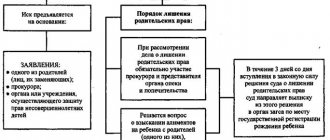Nowadays it is often said that guardianship authorities, by law, can deprive parental rights and take a child from the family at their own discretion or on the simple accusation of “well-wishers.” Is it that simple? Do all parents really need to be afraid that their child could be taken away for no reason at any time?
On what basis are parental rights deprived? Based on the decision of the district court at the request of the plaintiff in relation to one or both parents of the child - as written in paragraph 1 of Article 70 of the Family Code of the Russian Federation. This procedure does not apply to guardianship or trusteeship: a guardian or trustee can only be removed from performing duties in relation to a minor.
Grounds for deprivation of parental rights
Article 69 of the Family Code establishes an exhaustive list of grounds that allow you to file a claim for deprivation of the parental rights of a mother or father. To do this, it is established that the parents (or one of them):
- evade the fulfillment of parental responsibilities, including malicious evasion of child support payments;
- refuse, without good reason, to take their child from a maternity hospital (ward) or from another medical, educational organization, social service organization or similar institutions;
- abuse parental rights;
- children are cruelly treated, including physical or mental violence against them, and attacks on their sexual integrity;
- suffer from chronic alcoholism or drug addiction;
- committed an intentional crime against the life or health of their children, the other parent of the children, a spouse, including a non-parent of the children, or against the life or health of another family member.
IMPORTANT!
The presence of debt or a small amount of child support payments is not a sufficient argument for depriving parental rights. This fact is considered solely in connection with other manifestations of the guilty behavior of the parent (or both). Based only on this basis, it is impossible to file an application for deprivation of the parental rights of a father or mother (review approved by the Presidium of the Supreme Court of the Russian Federation on July 20, 2011).
There are situations when parents do not fulfill their responsibilities due to difficult circumstances and reasons beyond their control. This is, for example, a mental disorder or other chronic illness. The court has the right to make a decision on restrictions if there is a danger to the child, but will reject the application for the deprivation of rights. Law enforcement practice takes into account the specifics of each case (paragraphs 16-17 of the resolution of the plenum of the Supreme Court of the Russian Federation No. 44).
Where and who submits an application for deprivation of parental rights
A claim for deprivation of parental rights is filed in the district court at the place of residence of the respondent parent. The Code of Civil Procedure of the Russian Federation defines it as the first instance in such disputes (clause 4, part 1, article 23, article 24). The Code of Civil Procedure determines where an application for deprivation of parental rights is submitted, and the principles for choosing the venue for such processes (shown in the table).
| Territorial jurisdiction | Reasons |
| At the place of residence of the defendant, where he currently lives | Art. 28 Civil Procedure Code |
| According to the last expected place of registration of the defendant, if it is not known for certain where he currently resides | Art. 28 Civil Procedure Code |
At the place of registration of the applicant, only if there are good reasons:
| Art. 29 Civil Procedure Code Part 3 Art. 70 of the Family Code of the Russian Federation |
It must be remembered that such a claim is possible only against parents. Guardians, trustees, foster parents or foster carers are removed from the performance of duties, but are not deprived of parental rights (clause 3 of Article 39 of the Civil Code of the Russian Federation; clause 14 of the resolution of the plenum of the Armed Forces of the Russian Federation No. 44 of November 14, 2017). No less important is the question of who will be the plaintiff. This, among other things, determines where to apply for deprivation of parental rights and what documents should be collected. You have the right to file a claim (clause 1 of article 70 of the RF IC; clause 15 of the resolution of the plenum of the Supreme Court of the Russian Federation No. 44):
- one of the parents (regardless of whether he lives with the child);
- persons replacing parents (adoptive parents, guardians, trustees, foster parents, foster carers);
- prosecutor;
- body or organization charged with protecting the rights of minors.
IMPORTANT!
In order to protect the interests of minors, applications to the court for deprivation of parental rights are not subject to state duty (clause 15, clause 1, article 333.36 of the Tax Code of the Russian Federation).
General provisions
1. The Family Code of the Russian Federation (hereinafter referred to as the CK RF), having assigned priority in the upbringing of children to their parents, established that parental rights cannot be exercised in conflict with the interests of the child; When exercising parental rights, parents do not have the right to cause harm to the physical and mental health of children, their moral development, and methods of raising children must exclude neglectful, cruel, rude, degrading treatment, insult or exploitation of children (clause 1 of article 63, clause 1 of article 65 CK RF).
Parents who exercise parental rights to the detriment of the rights and interests of children may be limited by the court in parental rights or deprived of parental rights (clause 1 of Article 65, Article 69, Article 73 of the RF CC).
In exceptional cases, in the event of an immediate threat to the life of a child or his health, the guardianship and trusteeship authority has the right, in accordance with Article 77 of the RF CK, to immediately take the child away from the parents (one of them) or from other persons in whose care he is, on the basis of an act of the executive body authorities of a constituent entity of the Russian Federation or the head of a municipal entity, if the law of a constituent entity of the Russian Federation vests local governments with powers of guardianship and trusteeship in accordance with federal laws (hereinafter referred to as the act of the executive authority of the constituent entity of the Russian Federation or the head of a municipal entity on the removal of a child). In case of disagreement with the act of the executive body of the constituent entity of the Russian Federation or the head of the municipality on the removal of the child, the parents or persons in whose care the child was, may apply to the court with a claim to declare the said act invalid and to return the child to the family.
2. Cases on the restriction or deprivation of parental rights, on the abolition of restrictions on parental rights or on the restoration of parental rights, as well as on the invalidation of an act of an executive body of a constituent entity of the Russian Federation or the head of a municipality on the removal of a child and on the return of the child to the family are subject to resolution district court at the place of residence (location) of the defendant (Articles 24 and 28 of the Civil Procedure Code of the Russian Federation, hereinafter referred to as the Code of Civil Procedure of the Russian Federation). If, simultaneously with a claim for restriction or deprivation of parental rights, a demand for the collection of child support is filed (for example, by the parent with whom the child lives), then such a claim, based on the provisions of Part 3 of Article 29 of the Code of Civil Procedure of the Russian Federation, can be brought by the plaintiff to the court at his place of residence. residence.
When deciding whether to accept a statement of claim in these cases for court proceedings, it is necessary to keep in mind that in accordance with paragraph 1 of Article 54 of the Code of the Russian Federation, a child is recognized as a person who has not reached the age of eighteen years (the age of majority).
If the child has reached the age of eighteen years or has acquired full legal capacity before reaching that age as a result of emancipation or marriage (clause 2 of Article 21, clause 1 of Article 27 of the Civil Code of the Russian Federation, hereinafter referred to as the Civil Code of the Russian Federation), the judge, taking into account the provisions of clause 2 of Article 61 The RF CK refuses to accept the statement of claim on the basis of paragraph 1 of part 1 of Article 134 of the Code of Civil Procedure of the Russian Federation, and if proceedings have been initiated in the case, the court terminates the proceedings in accordance with paragraph two of Article 220 of the Code of Civil Procedure of the Russian Federation.
3. Taking into account the provisions of Article 78 of the CK of the Russian Federation and Article 47 of the Code of Civil Procedure of the Russian Federation, cases of this category are considered by the court with the participation of the guardianship and trusteeship body, which is obliged to conduct an examination of the living conditions of the child and his parent (parents), in relation to whom the question of restriction has been raised or about deprivation of parental rights, or a person claiming to raise a child (parent(s), who filed a lawsuit to cancel the restriction of parental rights or to restore parental rights, a parent(s) or a person in whose care the child was, demanding return of a child taken from them on the basis of Article 77 of the RF CK).
The question of conducting an examination of the living conditions of the child and the named persons should be resolved by the court at the stage of preparing the case for trial.
The submitted inspection report and the conclusion of the guardianship and trusteeship body based on it on the merits of the dispute are subject to assessment by the court in conjunction with all the evidence collected in the case (Article 67 of the Code of Civil Procedure of the Russian Federation).
Courts should keep in mind that based on the provisions of paragraph 1 of Article 34 of the Civil Code of the Russian Federation, paragraph 2 of Article 121 of the CK of the Russian Federation, as well as Article 6 of the Federal Law of April 24, 2008 N 48-FZ “On Guardianship and Trusteeship”, the conclusion of the guardianship and trusteeship authority must be signed by an authorized official of the guardianship and trusteeship body of a subject of the Russian Federation or a local government body (if the law of the subject of the Russian Federation vests local government bodies with powers of guardianship and trusteeship in accordance with federal laws).
4. When considering cases of restriction or deprivation of parental rights, cancellation of restrictions on parental rights or restoration of parental rights, as well as invalidation of an act of an executive body of a constituent entity of the Russian Federation or the head of a municipality on the removal of a child and on the return of the child to the family, the courts one should take into account the provisions of Article 12 of the Convention on the Rights of the Child and Article 57 of the RF CK, according to which the child has the right to freely express his opinion on all issues affecting his interests, as well as to be heard during any judicial or administrative proceedings.
Taking into account the provisions of these norms, a child who has reached the age of ten years or is under the age of ten years (if the court comes to the conclusion that he is able to formulate his views on issues affecting his rights) may be questioned by the court directly at the court hearing in order to finding out his opinion on the issue under consideration. It should be borne in mind that a decision to restore parental rights in relation to a child who has reached the age of ten years can be made by the court only with the consent of the child (Article 57, paragraph 4 of Article 72 of the RF Family Code).
5. If the demand is for the restriction of parental rights or for the deprivation of parental rights, for the abolition of the restriction of parental rights or for the restoration of parental rights, as well as for the return of children to the family, including in the case when they were selected in the manner provided for in Article 77 CK RF, declared in relation to two or more children, it is subject to resolution by the court, taking into account the interests of each child.
6. Cases of restriction or deprivation of parental rights, as well as restoration of parental rights are considered by the courts with the participation of the prosecutor (clause 4 of article 73 of the Code of Civil Procedure of the Russian Federation, clause 2 of article 70, clause 2 of article 72, article 45 of the Code of Civil Procedure of the Russian Federation).
With the participation of the prosecutor, based on the analogy of the law (Part 4 of Article 1 of the Code of Civil Procedure of the Russian Federation), cases on the abolition of restrictions on parental rights and cases on invalidating an act of an executive body of a constituent entity of the Russian Federation or the head of a municipality on the removal of a child and on returning him to a family with taking into account the fact that in accordance with paragraph 2 of Article 77 of the Code of the Russian Federation, in the event of a child being taken away due to an immediate threat to his life or health, the prosecutor is immediately notified of this by the guardianship and trusteeship authority.
7. If, when considering a case, the court finds in the actions of a party, other participants in the process, an official or another person signs of crimes provided for in Chapter 20 of the Criminal Code of the Russian Federation, or signs of other crimes committed against a minor, it, in accordance with Part 3 of Article 226 of the Code of Civil Procedure The Russian Federation reports this to the bodies of inquiry or preliminary investigation.
Courts should also not ignore facts of untimely adoption by guardianship and trusteeship authorities of measures to protect the rights and interests of minors protected by law, unlawful actions on the part of other persons leading to violations of children’s rights, and respond to them by issuing private rulings addressed to relevant organizations or officials persons (part 1 of article 226 of the Code of Civil Procedure of the Russian Federation).
What evidence is needed?
When going to court to take away the rights of one of the parents (or both), we recommend collecting as many certificates and written confirmations as possible:
- statement of refusal to pick up the child from the maternity hospital;
- certificate of non-payment of alimony;
- court decision to collect alimony;
- court order, bailiff's calculation of the debt of the alimony payer as of the date of filing the claim in court;
- certificate of search for the debtor - alimony payer;
- information about calls to the police and from the emergency room;
- sick leave certificates, medical report (if the parent is sick with chronic alcoholism or drug addiction);
- acts of inspection by guardianship officers of housing conditions at the place of residence of the child and at the place of residence of the defendant;
- conclusion of the guardianship and trusteeship department on the conditions for raising the child;
- a psychologist’s conclusion about the child’s psycho-emotional state;
- photographs, videos, letters, notes, witness statements.
The collected documents must confirm the circumstances under which the statement of claim for deprivation of the parental rights of the father or mother is recognized as valid (Article 55 of the Code of Civil Procedure of the Russian Federation, Article 69 of the Criminal Code). During preparation, the text will include an inventory of the attached supporting evidence. In addition to evidence, the following is provided to the court (Article 132 of the Code of Civil Procedure):
- child's birth certificate;
- divorce certificate (if available);
- power of attorney (if your interests are represented in court by another person);
- notification of delivery to other persons participating in the case, copies of the claim and documents attached to it (if these persons do not have them) or other documents confirming this direction.
Sample statement of claim
The form is available in every court on a stand with details for paying the state fee.
Example:
in …….. district court.
Plaintiff……..
Defendant……..
Statement of claim
I, Full Name, was married to Full Name from...... to....... From this marriage there is a child Full Name, born.
Currently ...... is avoiding raising the child and is a persistent non-payer of alimony, which is confirmed by ………..
Based on Art. 69 IC RF, please
Deprive …………..parental rights.
As you can see, drawing up such a claim does not cause any problems. The main thing is evidence.






